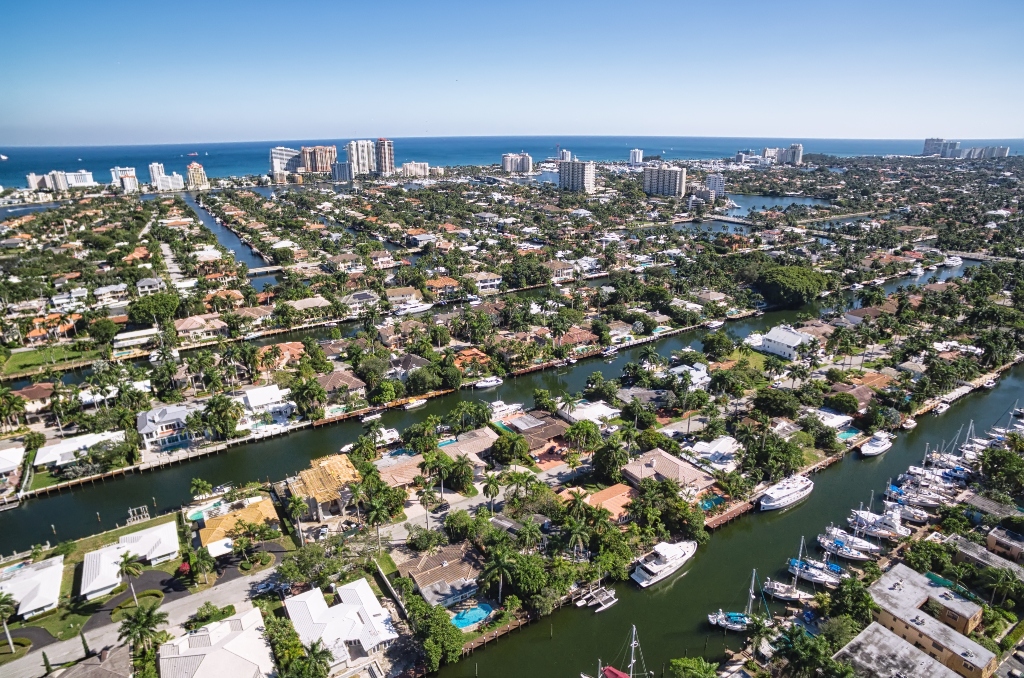Aerial view of Fort Lauderdale, Las Olas Isles, Florida, USA. Photo: Zhukova Valentyna/Shutterstock.com
It is currently unknown how COVID-19 will affect Florida real estate industry since we are still in the thick of the pandemic, but many lenders, homeowners, renters and landlords think this might have a long-lasting negative effect on their business and lives. It is certain thousands of people and businesses will have trouble paying their rent and mortgages because of lost jobs and lost business.
The latest numbers show this is only the beginning, and things aren’t looking so good. On top of that, things seem uncertain. But where there is a negative, there is also a positive. In the following paragraphs, we will show you the impact this pandemic may have on our Sunshine State’s commercial and residential real estate economy.
Forty percent of people are renters and two out of three of them spend at least thirty percent of their income on rent in South Florida. According to the federal government, anyone paying more than thirty percent of their income on housing is considered “cost-burdened,” meaning they may have trouble paying for other necessities like food, clothing and healthcare.
Florida Governor Ron DeSantis signed an executive order temporarily suspending evictions and mortgage foreclosures until mid-May last week a day after issuing the statewide stay-at-home order.
Some banks are trying to come up with solutions to help with the current situation. Wells Fargo Bank said in a statement to WLRN it is granting homeowners a three month suspension of payments on mortgages or home equity loans if they ask for it. After the three months is up, how the missed loan payments are treated depends upon a lot of factors, including who owns the actual loan. Banks don’t keep all the loans they issue, so other investors may have different demands. Bank of America also is offering borrowers more time by skipping payments now and tacking them onto the end of the loan.
This is what some of the national numbers for March look like, according to Realtor.com. The number of homes for sale declined by 15.7% year-over-year. The national median listing price grew 3.8%, to $320,000, however, there was a decline in homes sales. When looking at the weekly data, Realtor.com found that including the last two weeks of March as the coronavirus crisis hit more parts of the county, listing prices were growing at the slowest paces for 2020.
Due to the uncertainty of the outcome of COVID-19 shutdowns, there are numbers that show a decline in homebuyer interest around the country right now. In the weeks ending for March 21 and March 28, newly listed properties decreased by 13.1% and 34.0%, compared with the year before, according to Realtor.com. This is including the most up-to-date research. These numbers support the evidence of declining interest for potential buyers and sellers. A recent survey conducted by Realtor.com found this information out.
There are questions now being raised about how to go about renting to individuals thanks to this unprecedented situation. Landlords are debating whether it is legal or not to disclose whether their tenants have been diagnosed with COVID-19. Real estate attorneys say landlords aren’t legally required to disclose if a tenant tests positive for COVID-19, according to www.floridarealtors.org.
The real estate attorneys state that city laws, though, are changing quickly and COVID-19 disclosure requirement disclosures could change too.
Many landlords are reportedly telling tenants when a case of a COVID-19 infection surfaces in their buildings, even though they’re not required to do so. However, real estate attorneys are warning property managers and boards not to reveal who contracted the virus or which unit they live in due to strict HIPAA laws.
As of right now, tenants legally do not have to let anyone in the building know about whether they have COVID-19.

William is the Managing Editor at FloridaInsider.com. His years of experience in journalism, broadcasting and multimedia include roles as a Writer and Web Producer. He graduated from Florida International University with a Bachelor of Science and Communication.

